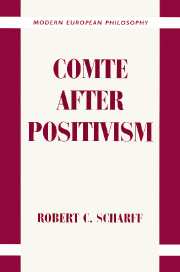Book contents
- Frontmatter
- Contents
- Preface
- Acknowledgments
- Note on Citations
- COMTE AFTER POSITIVISM
- Introduction: Comte for a Post-Positivist World
- Part I Comte Then
- Part II Comte Now
- 4 Comte's Ambiguous Legacy: Science Defended or Already Justified?
- 5 Cartesian Ahistoricism and Later Epistemic Analysis
- 6 Comte and the Very Idea of Post-Positivist Philosophy
- 7 Comte for Tomorrow?
- Bibliography
- Index
7 - Comte for Tomorrow?
Published online by Cambridge University Press: 06 July 2010
- Frontmatter
- Contents
- Preface
- Acknowledgments
- Note on Citations
- COMTE AFTER POSITIVISM
- Introduction: Comte for a Post-Positivist World
- Part I Comte Then
- Part II Comte Now
- 4 Comte's Ambiguous Legacy: Science Defended or Already Justified?
- 5 Cartesian Ahistoricism and Later Epistemic Analysis
- 6 Comte and the Very Idea of Post-Positivist Philosophy
- 7 Comte for Tomorrow?
- Bibliography
- Index
Summary
What kind of help, then, can Comte offer those post-positivists who have pursued the PIH question far enough to challenge not only the received conceptions of epistemic issues and their ontological implications but also the old understanding of the orientation from which these issues and implications should be “analyzed”? How can the historico-critical Comte help post-positivists work out a specifically philosophical stepping back to avoid further oscillation between the boring alternatives of positivism and historicism that Putnam sees as otherwise threatening to remain our lot? The answer, I think, depends on abandoning altogether the idea that such a historically minded stepping back would involve primarily either opposing or avoiding those old alternatives. For like both positivism and historicism, a post-positivism that contemplates philosophy literally “after” these two options is bound to get just as unreflectively caught up in an ahistorical orientation, and therefore to be just as unable to profit from rethinking Comte, as those options themselves.
Opposing positivism and historicism
To stop thinking of oneself as an opponent of positivism, however, is not easy. Even those who have taken the PIH question most seriously are rarely as eloquent about what ought to be the “next stage” in philosophy as they are about what it must not be. Rorty's pragmatism, for example, is much more clearly defined in its “antirepresentationalism” than it is as a vehicle for (re)new(ed) questioning of “what sort of human being you want to become.”
- Type
- Chapter
- Information
- Comte after Positivism , pp. 176 - 208Publisher: Cambridge University PressPrint publication year: 1995

